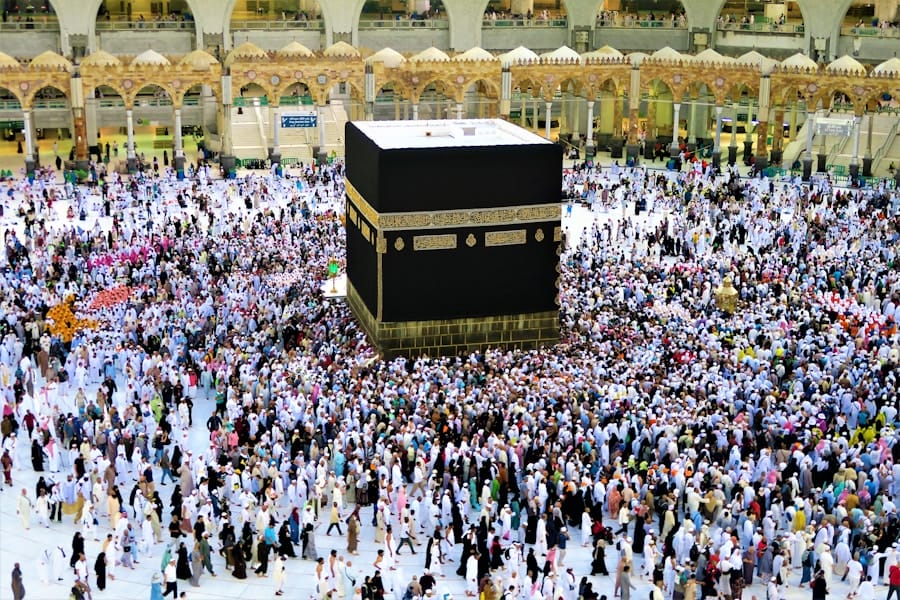Hajj, the annual pilgrimage to Mecca, is one of the five pillars of Islam and is considered a sacred duty for all Muslims who are physically and financially able to undertake the journey. It is a time of spiritual reflection, self-discipline, and unity with fellow believers. The pilgrimage takes place during the Islamic month of Dhu al-Hijjah and culminates in the celebration of Eid al-Adha, the Festival of Sacrifice. Millions of Muslims from around the world gather in Mecca to perform the rituals of Hajj, which include circling the Kaaba, running between the hills of Safa and Marwa, and throwing stones at pillars representing Satan. The experience of Hajj is deeply meaningful for Muslims, as it allows them to connect with their faith, history, and community in a profound way.
Historical Significance of Hajj in Islam
The roots of Hajj can be traced back to the time of the Prophet Ibrahim (Abraham) and his family. According to Islamic tradition, Ibrahim was commanded by Allah to build the Kaaba as a place of worship, and he and his son Isma’il (Ishmael) were the first to perform the pilgrimage to Mecca. The rituals of Hajj are believed to have been established by Ibrahim and have been preserved and practiced by Muslims for centuries. The historical significance of Hajj in Islam is immense, as it symbolizes the unity of the Muslim community and the submission to the will of Allah. The pilgrimage also serves as a reminder of the sacrifices made by Ibrahim and his family in their devotion to God. For Muslims, participating in Hajj is a way to honor their religious heritage and strengthen their connection to the teachings of Islam.
The Diversity of Muslim Backgrounds and Cultures
Muslims come from diverse backgrounds and cultures, with a wide range of languages, traditions, and customs. The global Muslim population includes people from countries in the Middle East, Africa, Asia, Europe, and the Americas, each with their own unique heritage and practices. Despite these differences, all Muslims share a common faith and are united by their belief in the oneness of Allah and the teachings of the Prophet Muhammad. The diversity within the Muslim community is reflected in the experience of Hajj, as pilgrims from around the world come together in Mecca to perform the rituals of the pilgrimage. This diversity adds richness and depth to the experience of Hajj, as it allows Muslims to learn from one another and appreciate the various expressions of their shared faith.
The Unifying Experience of Hajj for Muslims
Hajj is a unifying experience for Muslims, as it brings together people from different backgrounds and cultures in a common purpose. Regardless of their nationality or social status, all pilgrims are equal before Allah during Hajj, wearing simple white garments known as ihram and performing the same rituals. This sense of equality and unity is reinforced by the physical proximity of millions of pilgrims gathered in Mecca, creating a powerful sense of community and solidarity. The experience of Hajj fosters a deep bond among Muslims, as they share in the challenges and rewards of the pilgrimage together. This sense of unity extends beyond the physical journey to Mecca and has a lasting impact on the relationships and connections between Muslims around the world.
Challenges and Opportunities in Uniting Muslims through Hajj
While Hajj is a unifying experience for Muslims, it also presents challenges in terms of accommodating the diverse needs and backgrounds of pilgrims. The sheer number of people participating in Hajj each year can strain the infrastructure and resources available in Mecca, leading to logistical challenges and safety concerns. Additionally, political tensions and conflicts in the Muslim world can create divisions among pilgrims and hinder their ability to come together in unity during Hajj. However, these challenges also present opportunities for Muslims to work together to address common concerns and build stronger bonds within their community. By overcoming these obstacles, Muslims can strengthen their sense of solidarity and cooperation through the shared experience of Hajj.
The Impact of Hajj on Interfaith Understanding and Cooperation
Hajj has a significant impact on interfaith understanding and cooperation, as it provides an opportunity for non-Muslims to learn about Islam and engage with Muslims from diverse backgrounds. The pilgrimage attracts visitors from around the world who come to witness the rituals of Hajj and gain a deeper understanding of the faith and practices of Islam. This exposure can help dispel misconceptions and stereotypes about Islam and foster greater respect and appreciation for the Muslim community. Additionally, the experience of Hajj can inspire dialogue and collaboration between Muslims and people of other faiths, leading to increased understanding and cooperation on shared values and concerns. By promoting interfaith understanding and cooperation, Hajj contributes to building bridges between different religious communities and promoting peace and harmony in society.
The Continued Relevance of Hajj in Uniting Muslims from Diverse Backgrounds
In conclusion, Hajj remains a powerful force for uniting Muslims from diverse backgrounds and cultures, as it provides a shared experience that strengthens their faith, community, and sense of solidarity. The historical significance of Hajj in Islam underscores its enduring relevance as a symbol of unity and devotion for Muslims around the world. Despite the challenges that arise from accommodating large numbers of pilgrims and navigating political tensions, Hajj offers opportunities for Muslims to come together in cooperation and understanding. The impact of Hajj extends beyond the Muslim community to promote interfaith understanding and cooperation, contributing to greater harmony and peace in society. As Muslims continue to participate in Hajj each year, they reaffirm their commitment to their faith and their connection to one another, ensuring that the pilgrimage remains a source of inspiration and unity for generations to come.

